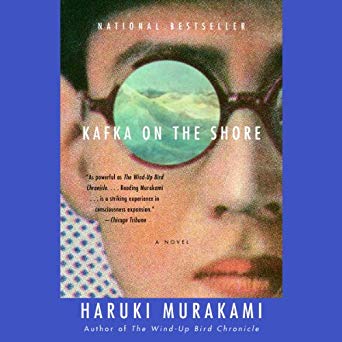

Support BOA by ordering Kafka on The Shore through these links:
Amazon U.S.
Apple Books U.S.
Amazon Japan
Thanks for helping support Books on Asia!

Kafka on the Shore (海辺のカフカ Umibe no Kafuka)
Published in Japanese in 2002
Translated into English by Philip Gabriel in 2005
“Murakami’s novels always take off in new directions at the same time that they build on the body of work that came before. In the case of Kafka, there are echoes of previous works; for instance, the two parallel narratives are reminiscent of the structure of Hard-Boiled Wonderland. What’s most strikingly a new departure, in terms of style, is having a fifteen-year-old narrator instead of Murakami’s typical thirty-something narrator. Still, the novel is recognizably Murakami throughout.” Philip Gabriel, from interview on translating Kafka on the Shore.
Book Description:
Kafka on the Shore follows the fortunes of two remarkable characters. Kafka Tamura runs away from home at fifteen, under the shadow of his father’s dark prophesy. The aging Nakata, tracker of lost cats, who never recovered from a bizarre childhood affliction, finds his pleasantly simplified life suddenly turned upside down. Their parallel odysseys are enriched throughout by vivid accomplices and mesmeriing dramas. Cats converse with people; fish tumble from the sky; a ghost-like pimp deploys a Hegel-spouting girl of the night; a forest harbours soldiers apparently un-aged since WWII. There is a savage killing, but the identity of both victim and killer is a riddle. Murakami’s novel is at once a classic quest, but it is also a bold exploration of mythic and contemporary taboos, of patricide, of mother-love, of sister-love. Above all it is an entertainment of a very high order.
(Audio) Book Description:
With Kafka on the Shore, Haruki Murakami gives us a novel every bit as ambitious and expansive as The Wind-Up Bird Chronicle, which has been acclaimed both here and around the world for its uncommon ambition and achievement, and whose still-growing popularity suggests that it will be read and admired for decades to come.
Similarly extraordinary scope and the same capacity to amaze, entertain, and bewitch. A tour de force of metaphysical reality, it is powered by two remarkable characters: a teenage boy, Kafka Tamura, who runs away from home either to escape a gruesome oedipal prophecy or to search for his long-missing mother and sister; and an aging simpleton called Nakata, who never recovered from a wartime affliction and now is drawn toward Kafka for reasons that, like the most basic activities of daily life, he cannot fathom. Their odyssey, as mysterious to them as it is to us, is enriched throughout by vivid accomplices and mesmerizing events. Cats and people carry on conversations, a ghost-like pimp employs a Hegel-quoting prostitute, a forest harbors soldiers apparently unaged since World War II, and rainstorms of fish (and worse) fall from the sky. There is a brutal murder, with the identity of both victim and perpetrator a riddle – yet this, along with everything else, is eventually answered, just as the entwined destinies of Kafka and Nakata are gradually revealed, with one escaping his fate entirely and the other given a fresh start on his own.
Extravagant in its accomplishment, Kafka on the Shore displays one of the world’s truly great storytellers at the height of his powers.
